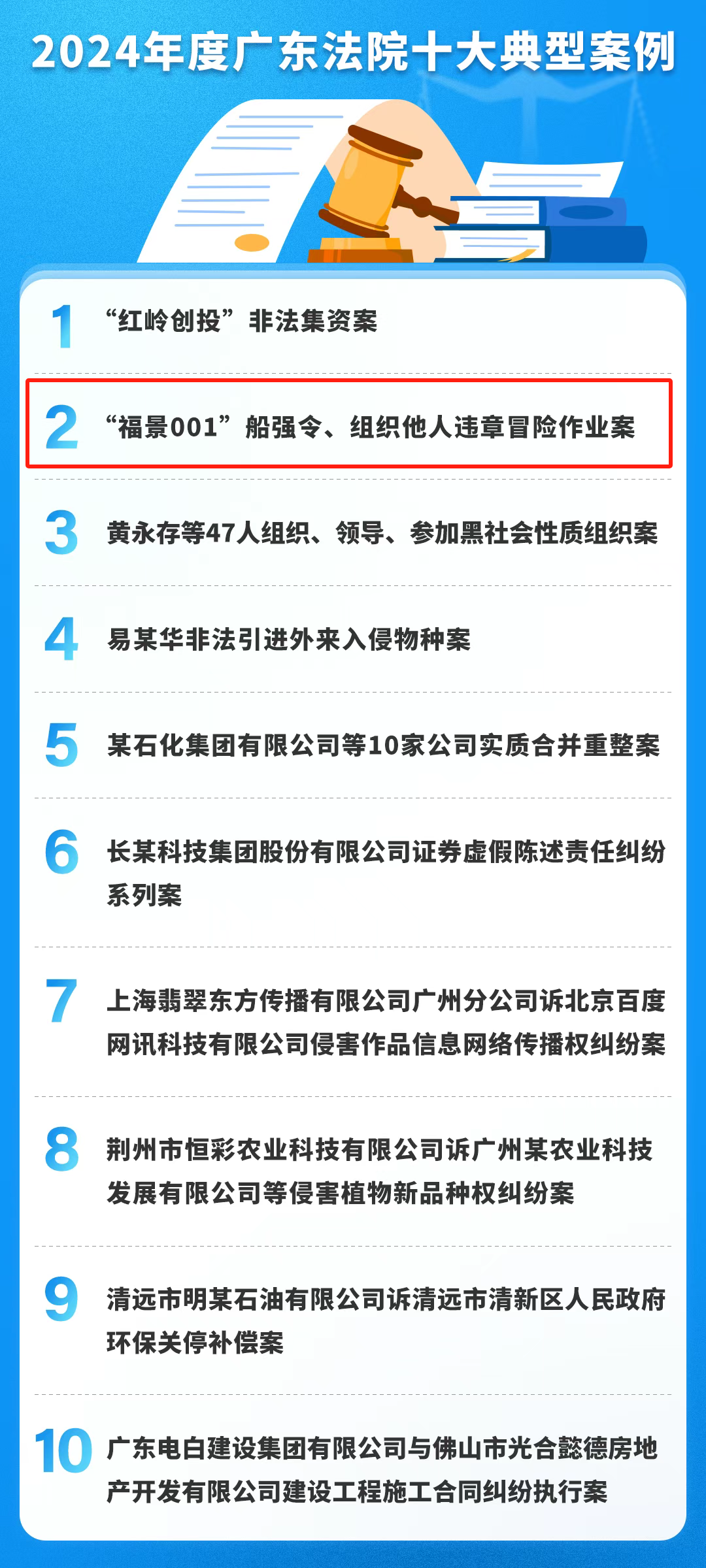



Recently, the Guangdong Provincial High People's Court released its 2024 list of "Top 10 Typical Cases" from courts across the province. These cases cover areas such as safeguarding national financial security, strengthening national biological security defenses, supporting Guangdong's technological self-reliance, and optimizing the rule-of-law business environment. Aligned with the provincial "1310" strategic deployment, the cases highlight judicial efforts to serve broader societal goals and uphold justice for the people, providing efficient and fair legal services for Guangdong's modernization. The case of the "Fu Jing 001" Vessel forced other persons to operate at risk in violation of rules, represented by lawyer Yu Jie of Sunhold Law Firm, was selected as one of Guangdong High Court's top 10 typical cases of 2024. This case not only clarified criminal liability determinations for major disaster accidents but also consolidated the social value of post-accident compensation for incidental civil action in criminal procedure. Furthermore, it sets an important precedent for handling similar incidents.

The case of the "Fu Jing 001" Vessel forced other persons to operate at risk in violation of rules

Case Overview
Xu Jun was the de facto controller of the "Fu Jing 001" vessel, while Wu Jianliang, Yang Hai, and Chu Naitao served as senior managers. At 8:00 AM on June 30, 2022, the vessel arrived at Yangjiang No. 2 Large Vessel Anchorage to shelter from an approaching storm, with 30 crew members remaining onboard. At 9:00 PM that day, Guangdong Provincial Energy Group Co., Ltd. ordered the evacuation of all personnel, but Xu Jun and others failed to comply and falsified the number of remaining crew. By July 2, impacted by Typhoon Chaba, the vessel suffered anchor failures and drift, with injuries reported. Despite requests from management to seek external rescue, Xu Jun ordered crew members to re-anchor and conceal the drifting. The vessel subsequently lost control, collided with wind turbine pilings in Yangxi County's Shapa Offshore Wind Farm, resulting in multiple disappearances and fatalities.
An investigation report by Yangjiang Maritime Safety Administration confirmed that the company and vessel operators failed to evacuate personnel, misreported crew numbers, and delayed requesting assistance after anchor failure, directly attributing liability to Xu Jun and the vessel management company. Post-accident, the vessel's parent company reached settlement agreements with victims' families and paid compensation.
Judgment
The Yangxi County People's Court ruled at first instance that Xu Jun and others, aware of major safety hazards, had coerced and organized crew to undertake risky operations, falsified personnel records, and delayed rescue efforts, leading to catastrophic casualties. Considering the severity and societal impact, Xu Jun was sentenced to 10 years in prison for the crime of coercing and organizing others to engage in risky operations in violation of regulations. The three co-defendants received sentences ranging from 5.5 to 7 years. The Yangjiang Intermediate People's Court upheld the verdict in the second instance.
Significance
Coercing violations of operational safety protocols poses grave threats to public safety. This high-profile case, involving a typhoon-induced shipwreck with multiple casualties, drew significant societal attention. The court implemented the criminal policy of combining leniency with severity, objectively assigning culpability based on managerial roles. Coordination with public security and judicial authorities ensured proper victim compensation and family support. Timely post-trial press releases addressed public concerns, achieving positive societal outcomes.



